Hailing from the west and looking to teach English in South Korea, we usually have very specific ideas on what constitutes public and private schools. It’s usually a choice between one or the other, public schools being run by the government of a country (unless you’re from the UK) and private schools are generally independently funded, and often more expensive.
Interested in Teaching English in South Korea? We’ll send you more info!
I myself attended a regular garden variety public school in my home town in South Africa with no butlers, manicured lawns, coat tails, elocution lessons or uniforms with some kind of a tartan influence (which is the way I imagined private schools to be, correct me if I’m wrong haha). But either way, there are a lot of differences between our idea of public and private schools versus the reality in South Korea. So I’ll try point out some of the similarities and differences and dispel any confusion on the various institutions.
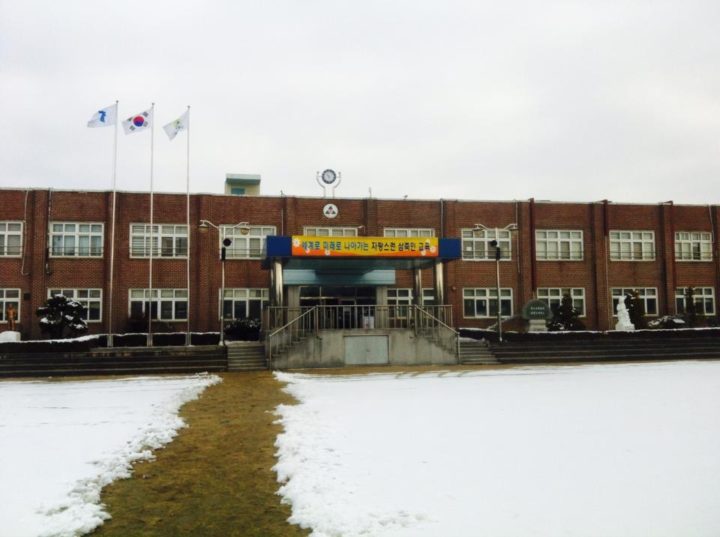
A typical public (government) school in South Korea, you’ll find they almost all have the same facade, right down to the clock, placement of flags and even the sculptures!
Education in South Korea is kind of a big deal
First things first, let me start by saying that South Korea places the utmost value on education. The word for teacher is “Sangsangnim” which is also a word that is used to show the highest form of respect (kind of like “sir/madam” but even more respectful than that). The kids start schooling at a very young age and on the day that they write their final exams which determine their future, working hours are pushed back to minimize traffic to ensure no one is late for the exam and no aircraft are scheduled to land during the reading time before exams. So to put it mildly- educations is a BIG DEAL.
With the focus on education, the quality of public schools is very high, all but eradicating the need to have private schools as we know them. So all kids go to public schools during the day and then after school they head over to private, extra afternoon and evening classes in private institutions, known as “hagwons”. They do not only have them for English, but for science, maths and music as well.
So bearing that in mind, what are the differences and similarities between schools?
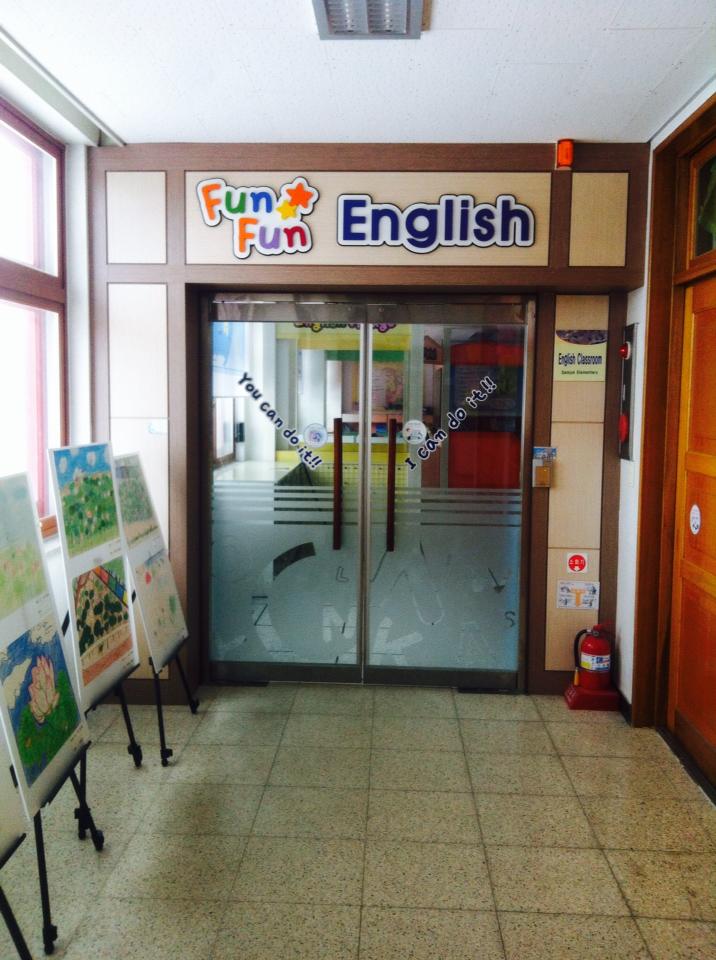
The entrance to my school’s English classroom area. As you can see, while Koreans may take education very seriously, it was still a fun place to be!
Operating Hours
Based on my explanation above, an obvious difference is the time of the day you’ll work. While you’ll work more or less the same number of hours per week (about 30-35 hours including actual teaching and lesson planning time), you’ll work them at different times of day. Public schools will be regular 9AM-5PM, and private schools will be in the afternoons and evenings; for example 1PM-9PM.
Time of the year to start
One of the major differences is the time of the year that you can go over. Public schools have only 2 major intakes per year that coincide with the semesters of the Korean school year. For public schools you can go in February for the start of the Korean school year in March, or in the fall intake around August/September. Private schools operate on a month to month basis, whenever there is a vacancy within our partner school network, except December/January as that is the time of the year that schools are closed for winter break.
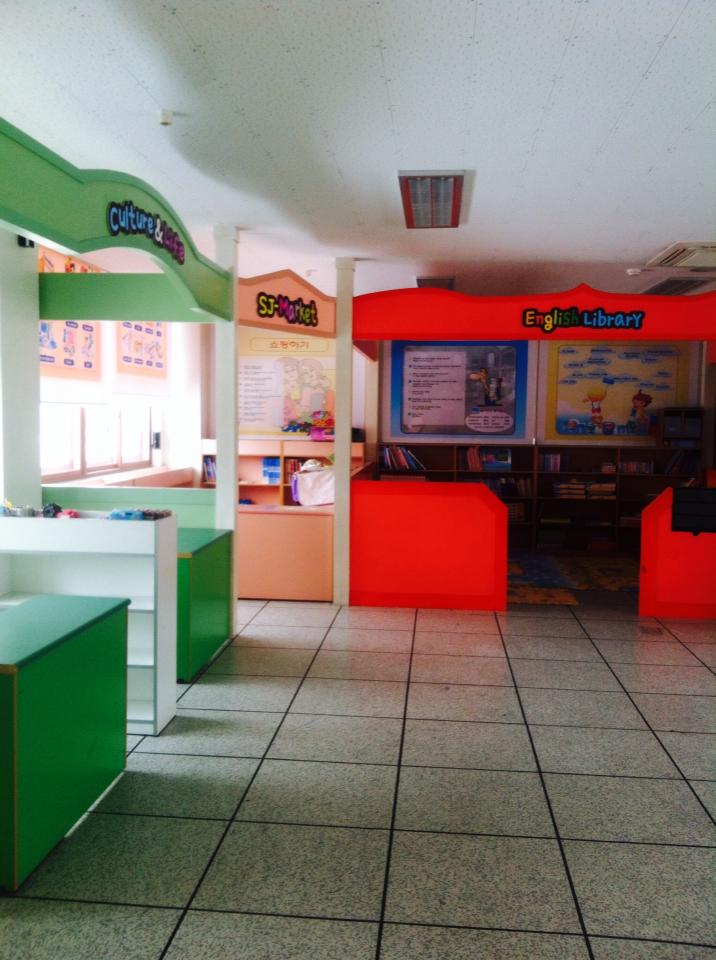
Here’s a rather candid shot of my classroom before the kids arrived. It had all been set up like a mini town with booths for places like the library or market where the kids could practice their conversational skills. Quite a bit different to what we’re used to back home!
Level of English and age ranges
Often in a public school, you’ll have quite varied levels of English proficiency. This is due to the fact that some kids have attended Hagwons since they were young, and others haven’t. This means some kids in your class will surprise you with their English skills and vocabulary, whilst others tend to struggle with the basics. In the private schools there are kids that are highly proficient, but overall they’ve been attending extra classes since they were young so all have quite a similar level of written and spoken English.
Age wise, public schools will have very set age groups based on elementary, middle and high school that set the age parameters. It’s very unlikely that you will end up teaching in a high school if you’re not a qualified teacher with lots of experience in Korea itself due to the aforementioned pressure regarding the university entrance exams. Placements are therefor likely in elementary or middle school with age ranges of about 5-12 years (elementary) or 13-15 years (middle school).
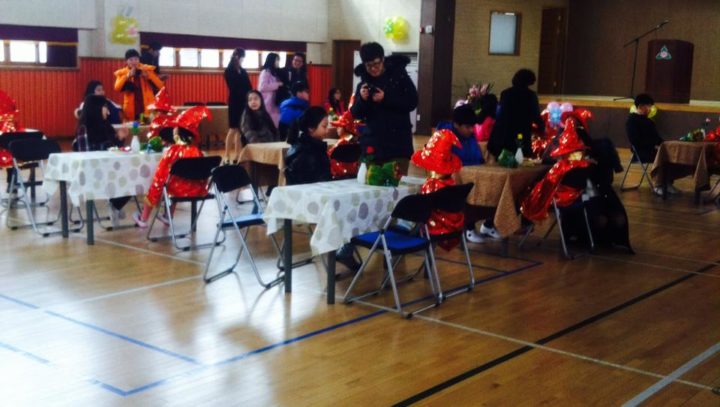
This was my first day at school, the grade ones (dressed in the cute red wizard outfits) have this graduation ceremony as they move up from Kindergarten. The grade 6s are seated with them to be their mentors on their first day.
Co-teachers and other foreign teachers
Public schools follow a co-teaching model, where a Korean teacher will be present to help you in your classes. The extent of their involvement varies from school to school, but they are the angels that help you set up your Alien Registration Card, bank accounts and in class they are there to translate and reiterate so that your kids can understand better, and they also help with discipline in the classroom. In the private schools, you usually teach by yourself and all your co-workers speak English as they’re part of the Hagwon staff.
In public schools, you will always be the only foreign teacher. In private schools, they often have about 2-4 foreign teachers.
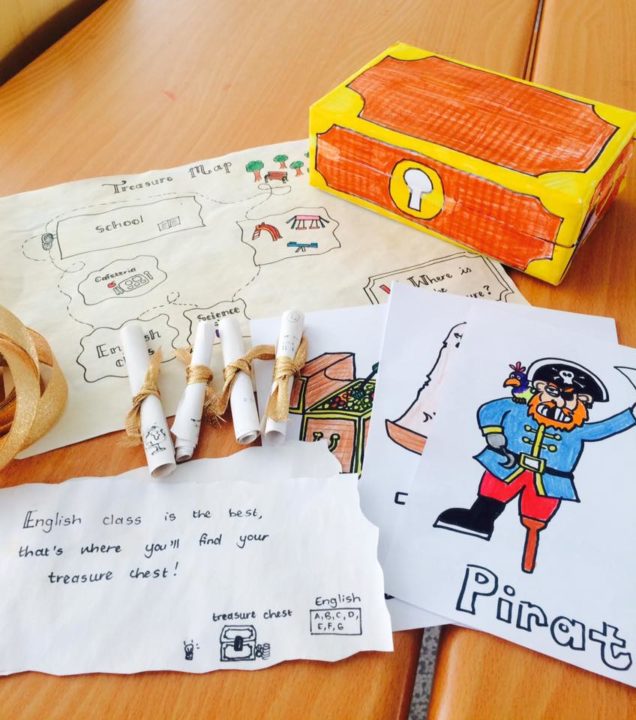
Coming up with lessons was endless fun like this pirate-themed one I did. If you’re at a private language centre you’ll find that much of the lessons are carefully planned for you which is sometimes preferred by many teachers!
Orientation
With public schools, there are usually large groups of 10 day orientations. They group teachers according to area such as Seoul and Gyeonggi-do Province, which is great for making sure that the other teachers you befriend during orientation live in the same greater area as you.
In private schools, there is no formal orientation, but when you arrive, the previous foreign teacher is usually still there toward the end of their contract to show you the ropes. Schools normally also do a welcome dinner for the new teacher.
TravelBud does a 3 weekend orientation for all our teachers – whether you work in public or private. You’ll have basic Korean language lessons, tea tastings in Insadong, go to the Grand Palace, do a tae-kwondo lesson, cooking classes and loads more. These weekends will usually take place to coincide with the new teaching terms in March and September. If you do our full in-class TESOL, you will have a great, immersive weeklong orientation as part of the TESOL course.
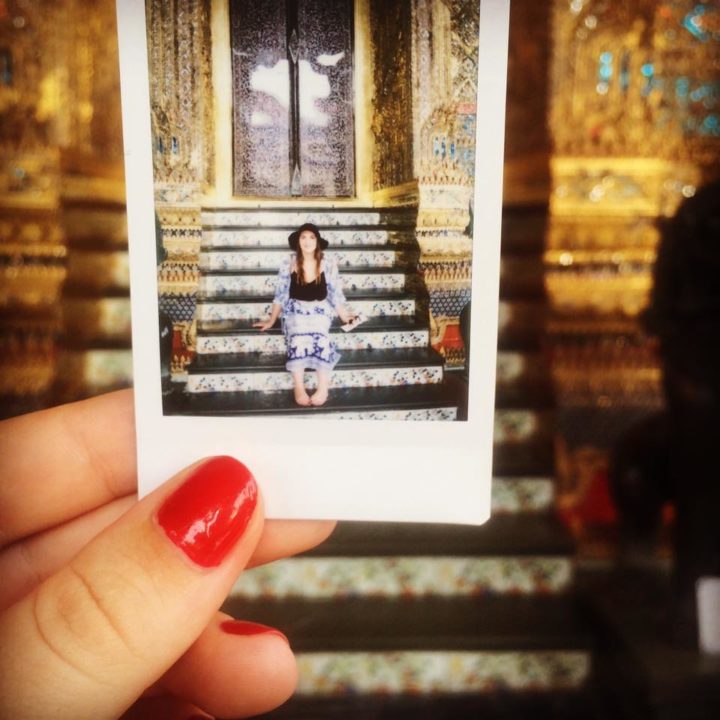
One of the great things about working in Korea is that regardless of whether you’re at a public or private centre, you’ll still have great benefits. I used my great pay and leave time to visit Thailand and soak up some much needed sunshine!
Benefits
The benefits for the public and private schools are very similar. Both provide accommodation, paid leave, and salaries that are very similar in amounts. Health insurance is guaranteed for the public schools, but will depend on your contract for private schools, but is generally included. Flight reimbursement is also guaranteed with both public and private, although public school reimburses both ways, and private schools normally do too, but the contract will state whether the exit flight is also reimbursed.
Requirements
The requirements are very much the same. However, public schools require South Africans and Canadians residing in Quebec to produce a signed letter from your education institutions that prove that you had 10 years of schooling in English. This is not necessary for private schools. Another slight difference is that if you hold a Bachelor of Education, you do not need to complete a TESOL/TEFL if you work in private schools. Public schools will require you to hold the certificate regardless.
Interested in Teaching English in South Korea? We’ll send you more info!


0 Comments